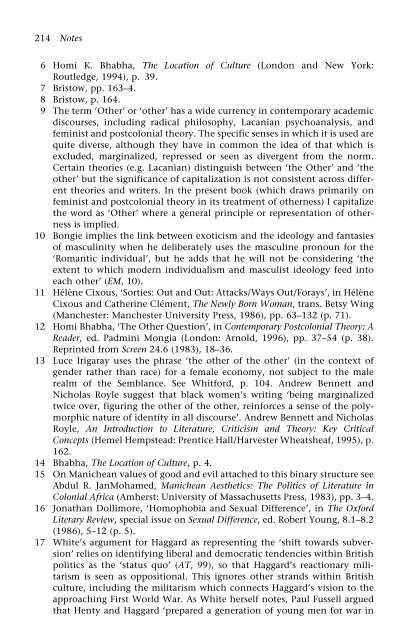Conrad and Masculinity
Conrad and Masculinity
Conrad and Masculinity
Create successful ePaper yourself
Turn your PDF publications into a flip-book with our unique Google optimized e-Paper software.
214 Notes<br />
6 Homi K. Bhabha, The Location of Culture (London <strong>and</strong> New York:<br />
Routledge, 1994), p. 39.<br />
7 Bristow, pp. 163–4.<br />
8 Bristow, p. 164.<br />
9 The term ‘Other’ or ‘other’ has a wide currency in contemporary academic<br />
discourses, including radical philosophy, Lacanian psychoanalysis, <strong>and</strong><br />
feminist <strong>and</strong> postcolonial theory. The specific senses in which it is used are<br />
quite diverse, although they have in common the idea of that which is<br />
excluded, marginalized, repressed or seen as divergent from the norm.<br />
Certain theories (e.g. Lacanian) distinguish between ‘the Other’ <strong>and</strong> ‘the<br />
other’ but the significance of capitalization is not consistent across different<br />
theories <strong>and</strong> writers. In the present book (which draws primarily on<br />
feminist <strong>and</strong> postcolonial theory in its treatment of otherness) I capitalize<br />
the word as ‘Other’ where a general principle or representation of otherness<br />
is implied.<br />
10 Bongie implies the link between exoticism <strong>and</strong> the ideology <strong>and</strong> fantasies<br />
of masculinity when he deliberately uses the masculine pronoun for the<br />
‘Romantic individual’, but he adds that he will not be considering ‘the<br />
extent to which modern individualism <strong>and</strong> masculist ideology feed into<br />
each other’ (EM, 10).<br />
11 Hélène Cixous, ‘Sorties: Out <strong>and</strong> Out: Attacks/Ways Out/Forays’, in Hélène<br />
Cixous <strong>and</strong> Catherine Clément, The Newly Born Woman, trans. Betsy Wing<br />
(Manchester: Manchester University Press, 1986), pp. 63–132 (p. 71).<br />
12 Homi Bhabha, ‘The Other Question’, in Contemporary Postcolonial Theory: A<br />
Reader, ed. Padmini Mongia (London: Arnold, 1996), pp. 37–54 (p. 38).<br />
Reprinted from Screen 24.6 (1983), 18–36.<br />
13 Luce Irigaray uses the phrase ‘the other of the other’ (in the context of<br />
gender rather than race) for a female economy, not subject to the male<br />
realm of the Semblance. See Whitford, p. 104. Andrew Bennett <strong>and</strong><br />
Nicholas Royle suggest that black women’s writing ‘being marginalized<br />
twice over, figuring the other of the other, reinforces a sense of the polymorphic<br />
nature of identity in all discourse’. Andrew Bennett <strong>and</strong> Nicholas<br />
Royle, An Introduction to Literature, Criticism <strong>and</strong> Theory: Key Critical<br />
Concepts (Hemel Hempstead: Prentice Hall/Harvester Wheatsheaf, 1995), p.<br />
162.<br />
14 Bhabha, The Location of Culture, p. 4.<br />
15 On Manichean values of good <strong>and</strong> evil attached to this binary structure see<br />
Abdul R. JanMohamed, Manichean Aesthetics: The Politics of Literature in<br />
Colonial Africa (Amherst: University of Massachusetts Press, 1983), pp. 3–4.<br />
16 Jonathan Dollimore, ‘Homophobia <strong>and</strong> Sexual Difference’, in The Oxford<br />
Literary Review, special issue on Sexual Difference, ed. Robert Young, 8.1–8.2<br />
(1986), 5–12 (p. 5).<br />
17 White’s argument for Haggard as representing the ‘shift towards subversion’<br />
relies on identifying liberal <strong>and</strong> democratic tendencies within British<br />
politics as the ‘status quo’ (AT, 99), so that Haggard’s reactionary militarism<br />
is seen as oppositional. This ignores other str<strong>and</strong>s within British<br />
culture, including the militarism which connects Haggard’s vision to the<br />
approaching First World War. As White herself notes, Paul Fussell argued<br />
that Henty <strong>and</strong> Haggard ‘prepared a generation of young men for war in




